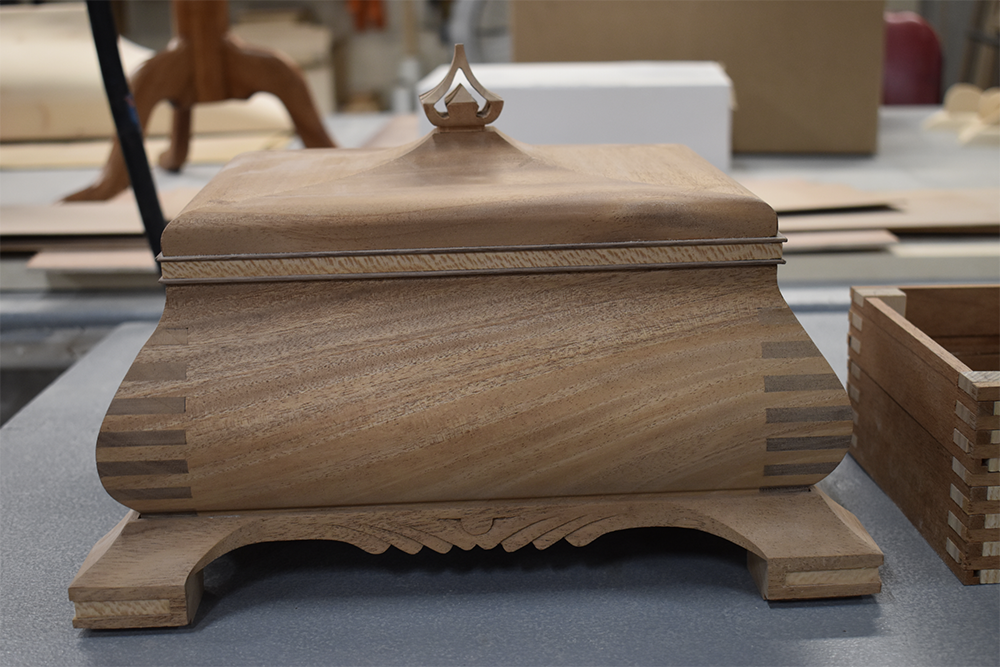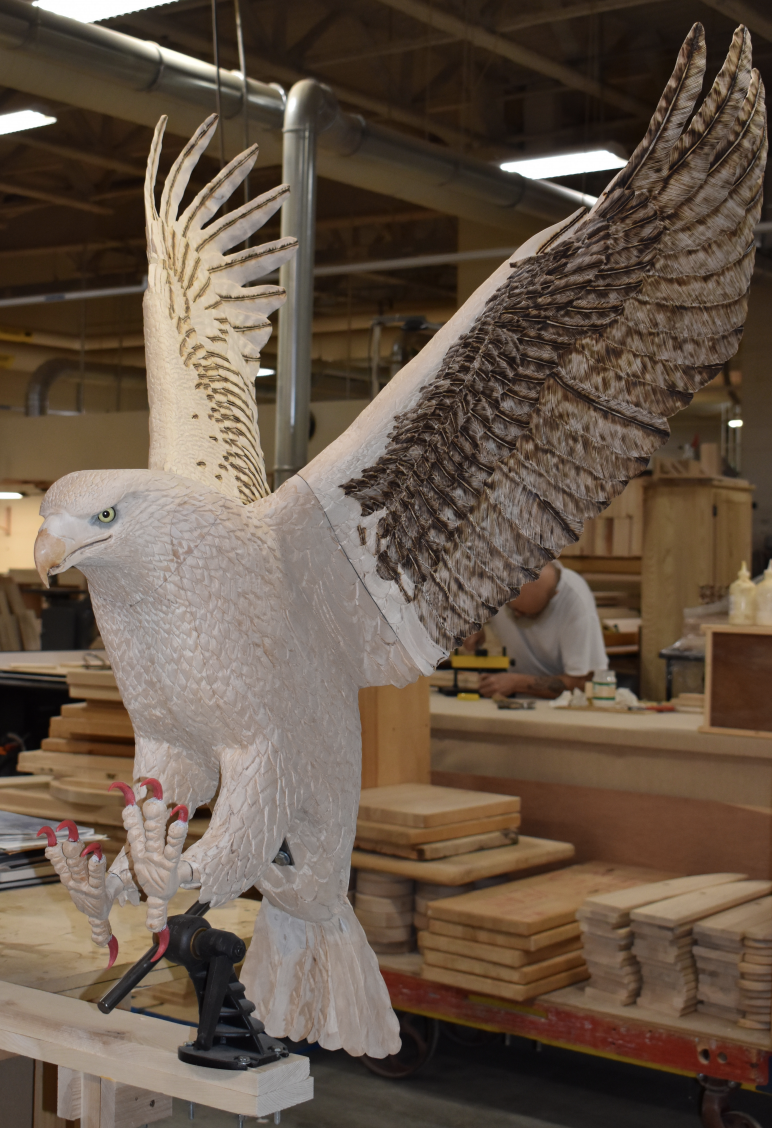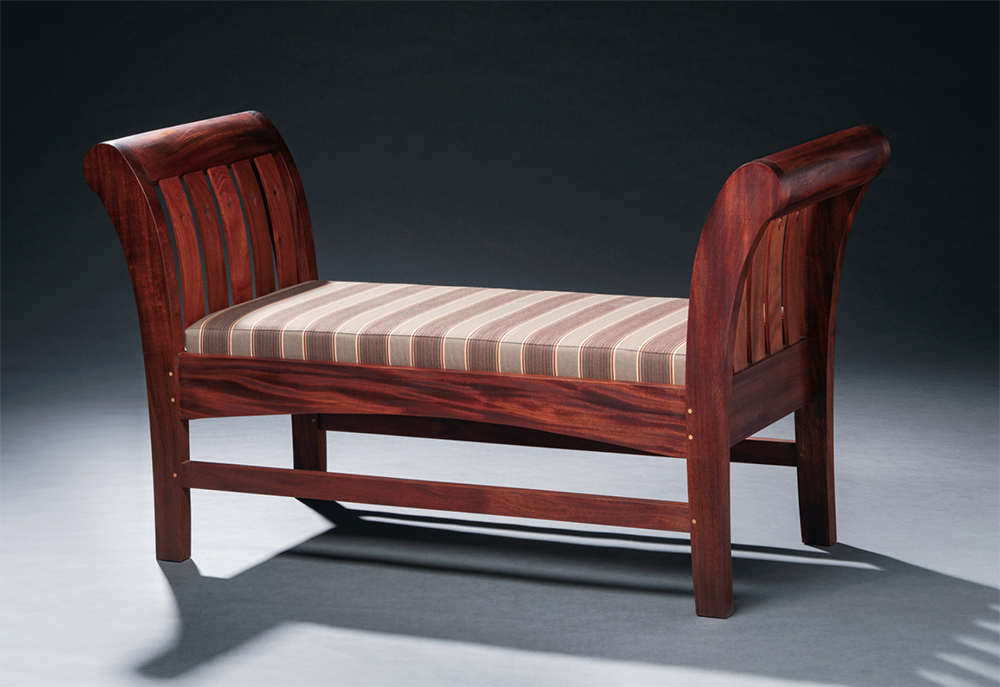Blog
Fine Studio Furniture Has Unlikely Origins
American Furniture Masters Institute Members Mentor Inmates in Fine Craftsmanship
This is an article written about the Prison Outreach Program in the Maine State Prison. The program is administered by the American Furniture Masters Institute, which is the educational branch of the New Hampshire Furniture Masters. The American Furniture Masters Institute has successfully run the Prison Outreach Program in the New Hampshire State Prison since 1999; the Maine Program is modeled after this program. AFMI is now in the process of developing a Prison Outreach Program in the New Hampshire Correctional Facility for Women. The American Furniture Masters Institute relies on grants and donations to keep their vital programs running, including the Prison Outreach Program. Please consider making a year-end donation to support these initiatives – click here.

In a small corner of a football field-sized woodworking facility at the Maine State Prison in Warren a micro-studio is producing fine handmade furniture that appears in regional galleries and furniture shows, destined for showplace homes and corporate settings around the world. Less tangible but equally important is the sense of accomplishment and optimism this studio develops inside the closed world of prison life.

The Fine Woodworking Program at the Maine State Prison is an outreach venture of the American Furniture Masters Institute, operating under the authority of the Maine Department of Corrections. “A group comprised of Furniture Masters Brian Reid and Terry Moore, along with Gallery Owner Tyra Hanson proposed this idea in concept in a meeting with Former Commissioner Jerry Ponte,” explained Howard Hatch a Furniture Master who now teaches the program. “Commissioner Ponte along with Deputy Warden Robert Walden and Industries Manager Ken Lindsey were very receptive, quickly coming up with ways to incorporate a studio workshop into the existing woodworking production facility where many inmates work.”
The success of a similar program with the NH Department of Corrections, which was initiated in 1999 at the suggestion of a Superior Court judge, Justice Kathleen McGuire, demonstrated the Furniture Masters’ ability to work in the unique prison setting, respecting all protocols while providing a rehabilitative service to inmates. Each state and facility has its unique requirements, but Commissioner Joseph Fitzpatrick, who had recently been appointed to the position, and Warden Randy Liberty recognized the potential benefits that such a program could provide as an incentive for good behavior, an outlet for creativity and a way to develop woodworking skills at a Master level as well as interpersonal and disciplinary skills and a level of self respect that could provide post-incarceration career opportunities.
Essentially all of the 140+ inmates at the Maine State Prison have assigned jobs where they work Monday through Friday, many of them in the woodworking shop where they produce items for sale at a shop in Thomaston and finish cabinetry for state offices and buildings. The Fine Woodworking Program is available only outside of working hours; on weekends or at other times when there is some time allocated for optional activities. Inmates apply to take part in the program and admission is determined by Dept. of Corrections staff based on individual characteristics.
“I want to work with someone who wants to learn,” said Hatch. He is happy to teach motivated individuals; realizing that while some will have potential to become true artists and others can learn to follow detailed plans all will benefit from the intellectual stimulation of woodworking and learning a new craft. Hatch leads the participants through a structured progression, a curriculum, of micro-steps that teaches skills and respect for the materials and tools of the craft. Early lessons include making pegs and hand cut joints including the “dovetail” which features in many pieces of fine furniture. In addition to learning how to use and care for the tools, participants must learn the characteristics of various types of wood and how it reacts to changes in environment and humidity over time. Due to the limited number of hours per week that the fine furniture workshop is open this is no crash course in woodworking, however participants come to the workshop eager to make the most of the six hours allotted each Sunday, plus free time during the work week when entire woodworking facility is full staffed.
Hatch explained that budget constraints occasionally threaten to preclude opening the workshop, but Industries Manager Ken Lindsey will come in on his own time to allow the workshop to open because he is so convinced of the program’s importance.
As Justice McGuire who was so instrumental in getting the Granite State’s program started explained, “The Furniture Masters provide an incomparable opportunity for inmates to learn highly sophisticated woodworking techniques. Time spent in prison becomes more productive and the inmates, 98 percent of whom are released from prison at some point, are better prepared to earn a living on the outside. But there are other, intangible benefits to this program. These craftsmen are dedicated family men and responsible members of their community. They are good men who set a good example with personal strengths and values each time they work side by side with an inmate.”

This piece has been on display at the Furniture Masters’ Gallery in Concord, NH. Photo by Bill Truslow
From behind the barbed wire in Warren to gracious settings in homes and office settings near and far, furniture and items produced in the Fine Woodworking Program generally make a stop in a furniture show or a private gallery such as the one owned by Tyra Hanson in Somes Sound. Surrounded as it is by yachts and Maine “summer cottages” The Gallery at Somes Sound is well positioned to present fine furniture to a clientele that appreciates woodworking and has the homes to host such pieces.
Hanson was one of the initiators of the Fine Woodworking Program having learned of the Furniture Masters program in NH while attending an auction in the Granite State. “I completely fell for a piece of furniture for my gallery at this auction,” said Hanson, “and I had to learn more about the artist. When I learned he was part of the NH prison program, I said ‘we have to make this opportunity available in Maine’s prisons, too’.” Working with Brian Reid, a Furniture Master whose work she represents, Hanson set the wheels in motion for the meeting with Commissioner Ponte.
Brian Reid served as lead instructor for the Fine Woodworking Program’s first five years, supported by Howard Hatch and Dylan Fuller. Hanson helped jumpstart the program with strong gallery presence in the early years. In 2017 Hatch stepped up to take on the lead instructor responsibilities and time commitment with help from Furniture Master Jeffrey Cooper. Now, in addition to the Gallery at Somes Sound, works have attracted buyers directly at the Prison Industries showroom in Thomaston, through Furniture Masters exhibitions and shows, and by commission.
“Beyond talent and commitment to their studios, what sets the Furniture Masters apart is their collective commitment (holistic vision) to the future of their craft,” said Mary McLaughlin, Board Chair of the non-profit American Furniture Masters Institute. “It’s my understanding that this is one of the only outreach programs in the Country that teaches inmates a skill at a Masters level. Many of the skills being taught through our program are transferrable to jobs outside of furniture making. Our ultimate goal is to reduce the level of recidivism and to enable inmates to move on to viable career paths upon their release from prison. To date, we can say that none of the inmates who participated in our program and have already been released have ended up back in prison. We are quite proud of that fact.”
